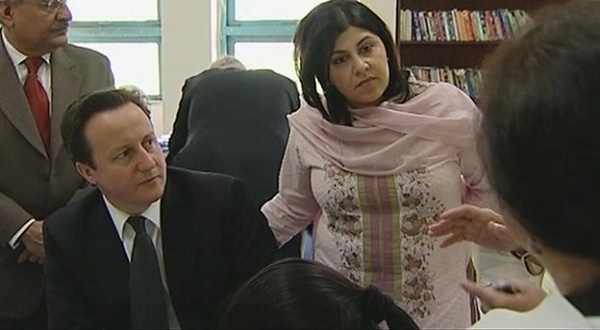
The first-ever female Muslim Minister in the history of Britain, Sayeeda Warsi, has displayed extraordinary courage by resigning as a Foreign Office Minister over the David Cameron Government’s “morally indefensible” stand on Israeli barbarism in Gaza.
Such moral courage is a rare quality in any politician anywhere in the world. Those who put their conscience before political interests are very rare. And when it comes to Muslim politicians sadly this quality is even rarer.
Sayeeda Warsi, married and mother of a daughter, was born to immigrant Pakistani parents. She studied and practised law before contesting first election against Labour in 2004 and was talent spotted by Conservative leader Michael Howard, who offered her a new role as vice-chairman of the party.
She describes her father, a former mill worker who later built a £2m a year bed-building company, as a great inspiration for her and gives him all the credit of giving her ideals and principles and who, at the height of a controversy, had lectured her as, “Sayeeda, what is the point in being in a position of leadership if you don’t lead on issues that are so fundamental? This is so stomach churningly sick that you should have been out there condemning it as loudly as you could. Uniquely, you are in a position to show leadership on this.”

Sayeeda Warsi is not the first British minister to have taken such a courageous and high moral stand and to have made such a self-sacrifice though. Before her, International Development Secretary Claire Short, leader of the Commons Robin Cook and Home Office Minister John Denham had left Tony Blair’s cabinet in 2003 over Iraq.
However, as someone from a working class Muslim family background, who gained such a prominence in British politics, to have taken such a bold and principled stand would not be an easy thing for many Asian or black politicians.
She has been praised and commended for her courage by many, especially by the Muslims not only in Britain but outside as well. India’s leading Urdu newspaper Inquilab in its editorial (6 August 2014) writes: “…her resignation in protest against Britain’s policies on Palestine is not only a pleasing event but is also such a courageous act that should embarrass and put to shame those Muslim states and their heads who have either buried their heads, like an ostrich in the sand or have adopted complete silence or have been issuing feeble statements and have been making futile efforts to be counted among those who have some sense of self-dignity and self-respect.”
Reminding its readers that Lady Warsi was demoted in 2012, London’s Evening Standard says, “…she was always a little too independent-minded for the comfort of the party leadership. Her criticisms of Israel’s war in Gaza, via Twitter, have further discomfited the PM.”
Criticizing Cameron on his pro-Israeli policies, the paper writes, “The departure also highlights Mr Cameron’s keenness to avoid taking any real position on the conflict, since while Ms Warsi cited the Government’s “policy on Gaza” as her reason, in truth it has no policy beyond expressions of concern at casualties and a token £3 million extra in aid. Ministers have refused to condemn Israel…”
However, in Britain many within and outside supporters of her party have disapproved her action with derision and contempt. A cynical column published in the pro-Conservative Daily Mail went to the extent of calling Ms Warsi’s resignation as the result of her ungratefulness to David Cameron and her overambitious disposition: “As a display of cynicism and disloyalty, the timing of Baroness Warsi’s resignation from the Government could not have been more calculating.”
The paper goes on to say, “A veteran of PR photo-calls — as a daughter of Pakistani immigrants, she attended her first Cabinet meeting wearing a pink and gold shalwar kameez — Warsi knew the impact of her departure would be far greater coming only hours after she had been seen sitting alongside the Duchess of Cornwall at the Abbey…one questions whether her departure also owes much to her resentment over her stalled ministerial career.”
The Guardian’s assistant editor and columnist Michael White wondered: “Sayeeda Warsi’s resignation was brave, but was it wise? Speaking out and enjoying renewed freedom to do so can be exhilarating, but it can also be lonely and self-defeating. ‘If only I was still in government,’ Warsi will find herself saying. Catalyst or 24-hour wonder? Warsi will discover in due course.”
But then this is not the first time when Lady Warsi has spoken up her mind. In 2011, when she was the co-chair of Conservative Party, she made the headlines when, in a speech in Leicester University, she attacked growing Islamophobia in Britain where, she said, prejudice against Muslims had “passed the dinner-table test” and become socially acceptable in the UK.
Earlier in 2009 addressing Conservative Party conference she had said that anti-Muslim hatred had become Britain’s last socially acceptable form of bigotry and claimed in a magazine article that taking a pop at the Muslim community in the media sold papers and didn’t really matter.
As it happens on such historic occasions, her straightforwardness, boldness and commitment in what she believes in will be, and is being, interpreted in various ways.
From some quarters she will even be accused of stoking anti-Semitic feelings. However, the pro-Israeli Jewish Chronicle reported her in 2011 as saying at the European Institute for the Study of Anti-Semitism Lecture at the House of Commons that it was, “abhorrent that some people actually believe that anti-Semitism does not exist in the world today. We must drain the poison of anti-Semitism from our country. As a Muslim, for me, Islamophobia is personal. But for me, Anti-Semitism is just as important.”
Reporting her resignation and acknowledging her contribution towards better community relations, the Jewish Chronicle said, “During her time in government she had worked closely with Jewish communities and organisations, concentrating particularly on Holocaust remembrance and the role of women in religion.”
Conservative Party’s Mayor of London Boris Johnson, a self-proclaimed Zionist, and an Israeli supporter, who at times also boasts of his Muslim ancestry, hoped that Warsi will come back.
However, the fact is that as of now ostensibly her political career seems to come to an end. Besides, Britain’s powerful Israeli lobby has never forgiven anyone who has crossed what they consider to be the limits that should not be crossed–criticism of Israel’s brutal policies.
One of those who have had to pay a heavy price for this “crime” was David Mellor, himself a Jewish and a Foreign Office Minister in Mrs Thatcher’s cabinet. There have been assassination attempts on Warsi’s character in the past. With her having taken such a brave stand, it is very unlikely that Warsi would be allowed to come back.
